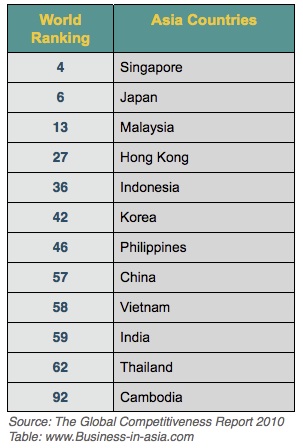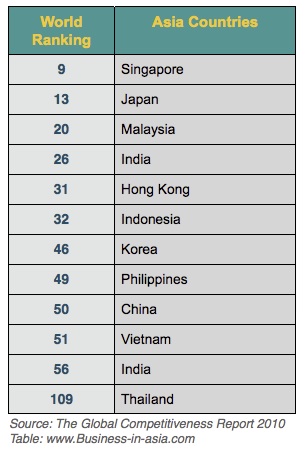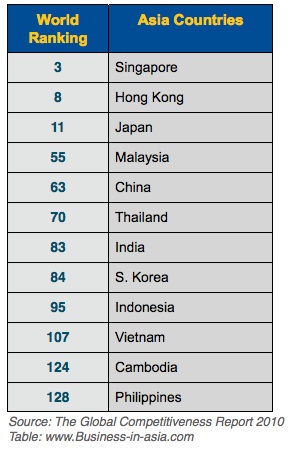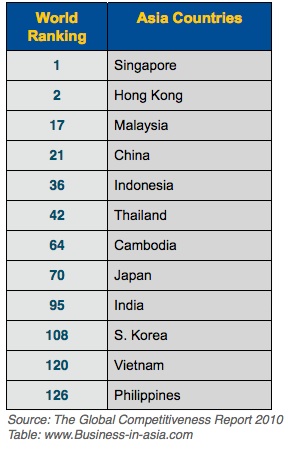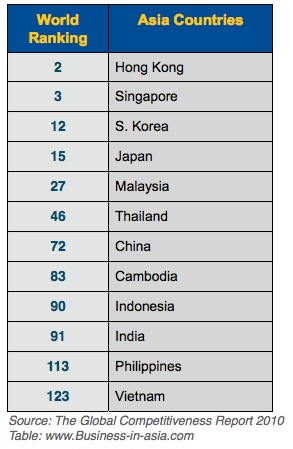
Competitiveness: The Philippines ranked
better globally than last year,
but continues to lag behind most Southeast Asian neighbors
|
Each year, one of the most notable research projects on world countries competitiveness is the annual Global Competitiveness Report by the World Economic Forum (WEF). The Philippines rises to 85th in the competitiveness list in 2010. The Philippines placed 85th out of 139 economies in the Global Competitiveness Report 2010-2011, slightly better than 87th place out of 133 in the year before report. Even though the country competitiveness slightly improved from last yea,r the country continues to lag behind most Southeast Asian neighbors. Six Southeast Asian neighbors were ranked higher than the Philippines: Singapore, Malaysia, Brunei, Thailand, Indonesia, and Vietnam; and the Philippines was ranked higher than Cambodia only in some categories. The “Global Competitiveness Report 2010-2011”, released by the World Economic Forum (WEF), has rankings that are based on the Global Competitiveness Index (GCI), developed for the World Economic Forum (WEF) by Professor Salai Martin, and introduced in 2004. The GCI is based on 12 pillars of competitiveness: institutions, infrastructure, macroeconomic environment, health and primary education, higher education and training, market efficiency, labor market efficiency, financial development, technological readiness, market size, business sophistication, and innovation. The rankings are calculated from both publicly available data and the Executive Opinion Survey, a comprehensive annual survey conducted by the World Economic Forum together with its network of partner institutes (leading research institutes and business organizations) in the countries covered by the study. This year, over 13,500 business leaders were polled in 139 economies. The report also lists the main strengths and weaknesses of countries, making it possible to identify key priorities for policy reform. The Philippines'
Results from the Global Competitiveness Report 2010 by the World
Economic Forum
(Source: The Global Competitiveness Report 2010) The Philippines' positive outcomes according to the report:
According to AFP news, The Philippines has become the call centre capital of the world, overtaking India as the number one player in the global business outsourcing market, according to industry data and the government. The country’s surplus of nurses and other medical professionals can also be harnessed for the outsourcing of health care services such as hospital billing, management of medical health records and ‘aftercare’ of patients and gives the Philippines obvious advantages for medical tourism as well.
The Philippines' main challenges according to the report:
The most problematic factors for doing
business in the Philippines
according to the report are:
Government acknowledgement on the country's competitiveness According to Philippines Business Report published by the Department of Trade and Industry (DTI), DTI Secretary Gregory L. Domingo welcomed the rise in the Philippines’ standing and forecast even higher rankings in the coming years. "We will see significant increases," said Domingo. Business groups were likewise optimistic that the Philippines is poised to record more gains. "With the new administration, it should improve even more. Give it three to six months and the rankings will move," said American Chamber of Commerce of the Philippines (AmCham) Executive Director Robert M. Sears. On the same note, Philippine Chamber of Commerce and Industry (PCCI) President Francis C. Chua said, "We’ve always believed we were competitive. If you consider that we have consistent growth, we really are one of the winners in the region." Our View: The Philippines hasn't gotten the attention directed to China, Vietnam and many other parts of SE Asia. With that said and as the report notes, there are positives and negatives on the Philippines. First, in terms of positives is the fact that English is almost uniformly spoken and understood. This makes it easier to do business. Additionally, the Philippines probably better understands US culture than any other Asian country. This is why call centers and business process outsourcing is booming in the Philippines. Indians also speak English but most Indians understanding of US culture is not as deep as your average Filipino. In service based industries, this is a considerable advantage and this is why business process outsourcing in the Philippines will continue to grow at a faster pace than in India. Also although there are undoubtably many problems at the present with government education policy, the new President has stated that this area will be a focus for his government. Also, politically the new government seems to have broad support and therefore the Philippines should avoid some of the turmoil found in other neighboring countries. All of these are positives. The negatives are poor infrastructure, bureaucracy, corruption, outdated labor laws and a government process that can often be time consuming to pass needed laws and make necessary changes. The proof for the new government will be in how effectively it continues to open the Philippines up for investment and increased business. 2011 will be the year in which the government will need to stand and deliver. If it does, the Philippines could be an increasingly interesting place to invest and site a factory. About
the Author:
Christopher W. Runckel, a former senior US diplomat who served in many counties in Asia, is a graduate of the University of Oregon and Lewis and Clark Law School. He served as Deputy General Counsel of President Gerald Ford’s Presidential Clemency Board. Mr. Runckel is the principal and founder of Runckel & Associates, a Portland, Oregon based consulting company that assists businesses expand business opportunities in Asia. (www.business-in-asia.com) Until April of 1999, Mr. Runckel was Minister-Counselor of the US Embassy in Beijing, China. Mr. Runckel lived and worked in Thailand for over six years. He was the first permanently assigned U.S. diplomat to return to Vietnam after the Vietnam War. In 1997, he was awarded the U.S. Department of States highest award for service, the Distinguished Honor Award, for his contribution to improving U.S.-Vietnam relations. |
